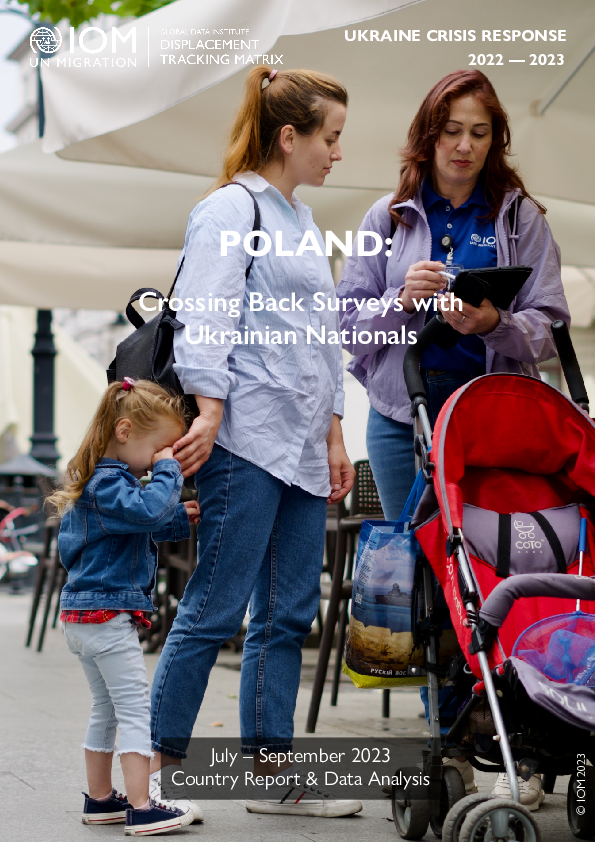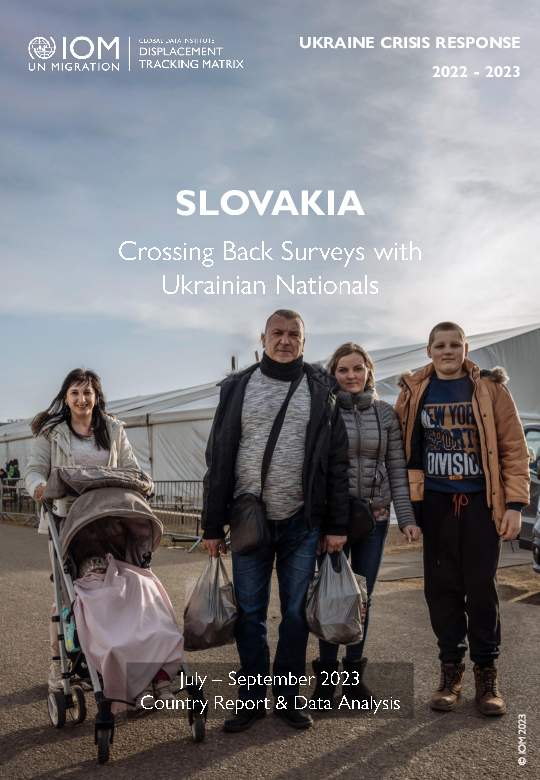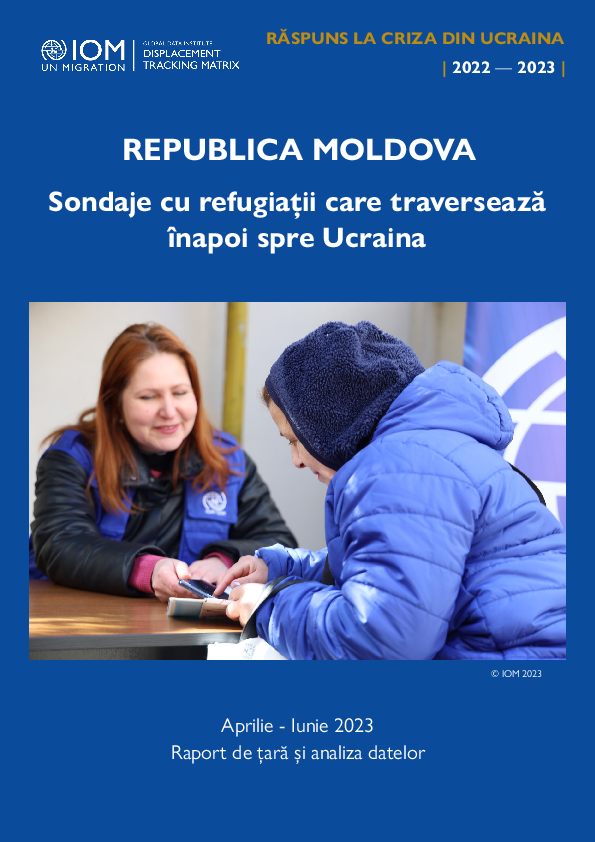-
Countries
-
Data and Analysis
-
Special Focus
-
Crisis Responses
Return migration

Contact
DTM Europe, DTMMediterranean@iom.int
Language
English
Location
Latvia
Period Covered
Jul 01 2023
Sep 30 2023
Activity
- Survey
- Return Intention
Key Findings
- Top 3 countries of stay abroad: Poland (34%), Germany (21%), Russian Federation (15%)
- Oblasts of origin: Donetska (27%), Luhanska (21%), Zaporitzka (14%).
- Destinations in Ukraine: going to same oblast of origin (90%), to a different oblast (8%)
- Intentions after arrival to Ukraine: long-term stay (48%), short-term visit (24%), 28% do not know.
- Top needs on the way to Ukraine:* general information (84%), food supply (11%), short-term accommodation (2%).
- Top areas of assistance received:* financial support (92%), accommodation (70%), food (59%)
* more than one answer possible

Contact
DTM Europe, DTMMediterranean@iom.int
Language
English
Location
Poland
Period Covered
Jul 01 2023
Sep 30 2023
Activity
- Survey
- Return Intention
Since 24 February 2022, refugees from Ukraine and Third Country Nationals (TCNs) have been fleeing to neighboring countries as a result of the war. As of June 2023, more than twelve million refugees from Ukraine were recorded at various border crossings entering Poland and ten million had crossed back since February 2022. This report is based on surveys collected in Poland between 03 July and 30 September 2023 at the train and bus stations in Przemysl, one of the primary border crossing points between Ukraine and Poland.
Key findings:
- Demographics: 37% of respondents were traveling with at least one child in their group, while 3 per cent had at least one child and at least one elderly person in their household
- Top 3 countries of stay abroad: Poland (46%), Germany (14%), Czechia (11%)
- Top oblasts of origin: Kyiv city (22%), Dnipropetrovska (16%), Zaporizka (14%) Kharkivska (11%).
- Intended destination: 90% of respondents were planning to return to their oblast of origin. Nine per cent of those, who intended on returning to another oblast, were mainly from Donetska and Zaporizka oblasts, as well as Kyiv city
- Intentions upon crossing back: long-term stay (41%), short-term visit (47%), 12% were not sure
- Top needs at the time of interview:* personal safety (53%), financial support (48%), health services (38%), and medication (28%). 42% of respondents did not report any needs
- Top areas of assistance received:* financial support (91%), accommodation assistance (43%), food (34%), WASH (Water, sanitation and hygiene) items (21%), clothes (18%) and transportation support (15%)
*more than one answer possible

Contact
DTM Europe, DTMMediterranean@iom.int
Language
English
Location
Hungary
Period Covered
Jul 01 2023
Sep 30 2023
Activity
- Survey
- Return Intention
Key Findings:
- Top 3 countries of stay: Hungary (63%), Germany (12%), Austria (5%).
- Top oblasts of origin: Kyiv (24%), Zakarpatska (18%), Dnipropetrovska (14%).
- Destinations in Ukraine: returning to oblast of origin (85%), returning to a different oblast (14%). Among those intending to return to a different oblast, top intended destinations included: Zakarpatska (68%), Kyiv city (21%), and Lvivska (6.5%).
- Most frequent mode of transport: train (86%).
- Intentions upon crossing back: long-term stay (over 30 days) - 23%, short-term visit (60%), does not know (17%).
- Top needs upon crossing back*: financial support (39%), accommodation (39%), transport (35%).
- Top areas of assistance received*: transport (67%), accommodation (46%), food (37%).
- About 3.7 million people were internally displaced in Ukraine as of September 2023 (IOM Ukraine GPS14 report) and about 5.8 million refugees were recorded across Europe as of end of October 2023 (UNHCR). As of September 2023, almost 4.6 million persons were estimated to be returnees in Ukraine after a period of previous displacement; of them, about 25 per cent (or 1.1 million) were returnees from abroad (IOM Ukraine GPS14 report).
- The number of total border crossings from Ukraine into neighbouring countries from February 2022 until October 2023 reached about 26 million, and at the same time about 18.9 million border crossings were registered in the opposite direction by Ukraine’s border authorities. While some persons returning to Ukraine from abroad intend to remain, others may be engaging in short visits to Ukraine or pendular movements between border areas for a variety of reasons.
- This report presents evidence on persons crossing back to Ukraine from abroad distinguishing between those who aim to remain in Ukraine for longer periods (prospective returnees) and those who plan to pay a short visit (short-time visitors). It is based on 8,563 surveys collected by DTM between July and September 2023 with adult individuals going to Ukraine. About 98 per cent of them were Ukrainians, and 2 per cent Third-Country Nationals (TCNs).
- Sections 2 to 7 focus on the 8,226 surveys with Ukrainian nationals met at the border areas of neighbouring countries to Ukraine: Hungary (333), Poland (925), Republic of Moldova (2,855), Romania (1,589), and Slovakia (2,524). Results are weighted for the number of border crossings into Ukraine from each country during the data collection period. In Section 8, evidence on persons interviewed while crossing back is complemented with data on returnees from abroad collected by DTM in Ukraine.
- The report also discusses the different profiles of Ukrainian nationals surveyed in Latvia (224) while crossing to the Russian Federation with the aim to reach areas of Ukraine which are under the temporary military control of the Russian Federation (Section 9). Additionally, it contains a section dedicated to TCNs crossing into Ukraine from abroad (113 interviews, Section 10). The report ends with a short section elaborating on the Methodology.

Contact
DTM Europe, DTMMediterranean@iom.int
Language
English
Location
Slovakia
Period Covered
Jul 01 2023
Sep 30 2023
Activity
- Survey
- Return Intention
Main findings
- Top countries of stay: Slovakia (80%), Czech Republic (4%), Austria (3%), Germany (2%), Ireland (1%) United Kingdom (1%).
- Intentions: 53% going for a short visit, 39% plan to stay in Ukraine (prospective returnees), and 8% undecided.
- Top needs*: health services (48%), medicines (31%), general information (26%), financial support (22%), language courses (22%), employment (21%). *more than one answer was possible (N=1,135).
- Destinations in Ukraine: 86% to the same oblast of origin, 14% to a different oblast in Ukraine: Zakarpatska (61%), Kyiv city (13%), Lvivska (10%).
- Transport to Ukraine: bus (82%), train (17%), car/minibus (1%).
- Travel mode: 66% alone and 34% in group.
- Experiences of discrimination: 13% experienced discrimination throughout their journey.
- Travelling with children: 68% of the respondents travelled with children aged less than 18 years

Contact
DTM Europe, DTMMediterranean@iom.int
Language
Ukrainian
Location
Republic of Moldova
Period Covered
Apr 01 2023
Jun 30 2023
Activity
- Survey
- Return Intention
З 24 лютого 2022 року біженці з України та третіх країн громадян (ГТН) тікають до сусідніх країн внаслідок війни. Станом на травень 2023 року в Європі було зареєстровано понад вісім мільйонів біженців з України було зафіксовано по всій Європі. У той же час, майже 13 мільйонів перетинів кордонів України та третіх країн було зафіксовано майже 13 мільйонів біженців та мігрантів з України до сусідніх країн, починаючи з лютого країн з лютого 2022 року.
МОМ розгорнула свої інструменти Матриці відстеження переміщень (МОМ) з з середини квітня 2022 року для проведення індивідуальних опитувань у сусідніх країнах з особами, які перетинають кордон з Україною, з метою покращення розуміння основних профілів, моделей переміщення, намірів та намірів та потреб осіб, які переїжджають в Україну. Цей звіт ґрунтується на результатах опитувань зібраних у Республіці Молдова в період з 01 квітня 2023 року по 30 червня 2023 року в двох пунктах перетину кордону - Отачі та Паланка.

Contact
DTM Europe, DTMMediterranean@iom.int
Language
Romanian
Location
Republic of Moldova
Period Covered
Apr 01 2023
Jun 30 2023
Activity
- Survey
- Return Intention
Începând cu 24 februarie 2022, refugiații din Ucraina și din țările terțe naționale (TCN) au fugit în țările vecine ca urmare a faptului că războiului. Începând cu mai 2023, peste opt milioane de refugiați din Ucraina au fost înregistrați în întreaga Europă. În același timp, aproape 13 milioane de de treceri la frontieră ale trecerilor la frontieră ale cetățenilor ucraineni și ale resortisanților țărilor terțe refugiați și migranți au fost înregistrate din Ucraina în țările vecine țările vecine începând din februarie 2022.
OIM a desfășurat instrumentele sale Displacement Tracking Matrix (DTM) începând cu mijlocul lunii aprilie 2022 pentru a colecta anchete individuale în țările vecine cu persoane care traversează în Ucraina, cu scopul de a îmbunătăți înțelegerea principalelor profiluri, a modelelor de deplasare, a intențiilor și a nevoile celor care se deplasează în Ucraina. Prezentul raport se bazează pe anchete colectate în Republica Moldova între 01 aprilie 2023 și 30 iunie 2023 în două puncte de trecere a frontierei, Otaci și Palanca.

Contact
DTM Europe, DTMMediterranean@iom.int
Language
English
Location
Republic of Moldova
Period Covered
Jul 01 2023
Sep 30 2023
Activity
- Survey
- Return Intention
Since 24 February 2022, refugees from Ukraine and Third Country Nationals (TCNs) have been fleeing to neighbouring countries as a result of the war. IOM has deployed its Displacement Tracking Matrix (DTM) tools since mid-April 2022 to collect individual surveys in neighbouring countries with persons crossing into Ukraine, with the aim to improve the understanding of main profiles, displacement patterns, intentions and needs of those moving into Ukraine.
This report is based on surveys collected in the Republic of Moldova between 01 July 2023 and 30 September 2023 in two border crossing points with Ukraine, Otaci and Palanca.
Key Findings
- Top 3 countries of stay abroad: Republic of Moldova (48%), Romania (11%), Türkiye (7%)
- Top oblasts of origin: Odeska oblast (35%), Kyiv city and Kyivska (22%), Mykolaivska oblast (7%)
- Intended destinations: going to same oblast of origin (92%), to a different oblast (8%) - mainly to Kyiv city, Vinnytska, and Odeska
- Intentions upon crossing back: long-term stay (58%), short-term visit (38%), don't know (4%)
- Top needs upon crossing back:* financial support (22%), medicines and health services (9%), support with personal safety and security (8%)
- Top areas of assistance received:* food products and meals (29%), financial support (28%), NFI/hygiene items (8%), accommodation (7%).
* More than one answer possible

Contact
DTM Europe, DTMMediterranean@iom.int
Language
English
Location
Romania
Period Covered
Jul 01 2023
Sep 30 2023
Activity
- Survey
This report analysed data from a survey carried out between July and September 2023 (Quarter 3, Q3). The survey sample included 1,601 individuals who were crossing back to Ukraine, including 1,589 Ukrainian nationals and 12 Third-Country Nationals (TCNs). The analysis focuses on Ukrainian nationals.
- Top 3 countries of stay abroad: Romania (53%), Bulgaria (19%), Italy (5%).
- Top 3 oblasts of origin: Odeska (38%), Chernivetska (16%), Kyiv city (9%).
- Transport to Ukraine: car (68%), bus (14%), walking (10%), minibus (8%).
- Top areas of assistance received*: food (27%), sanitary supplies (19%), accommodation (18%), and financial support (17%).
- Top 3 needs upon crossing back*: financial support (26%), personal safety (19%), and food supply (17%).
In the Middle East and North Africa (MENA) region, there were 16.2 million internally displaced persons (IDPs) as of end 2022. This figure constitutes 23 per cent of the global number of IDPs, making MENA the region with the second highest concentration of IDPs following the sub-Saharan Africa region. Most displacement in the MENA region (80%) has been triggered by armed conflict, particularly in Iraq, Libya, Syria and Yemen.
This report covers DTM activities in five countries (Iraq, Libya, Sudan, Yemen, and Lebanon) from April 2023 to June 2023. All five countries implemented mobility tracking activities. Flow monitoring in operational in Yemen and Libya, through a network of flow monitoring points (FMP) and Flow Monitoring Surveys with the main aim of tracking cross-border movement trends in the region.
Pagination
- Previous page
- Page 5
- Next page


